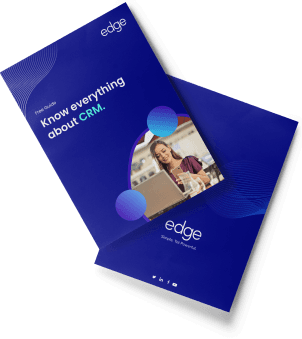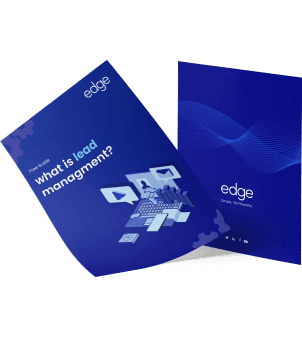Introduction
The global cybersecurity market is projected to reach USD 345.4 billion by 2026, which is driven largely by the rise in cyberattacks and data breaches as well as dependence on digital technologies. With companies moving more of their business operations online, CRM systems will be more of a principal customer relationship management and business development software, as these accounts will carry sensitive client information. On this note, corporations are under growing pressure to secure their customers' information since hackers and third-world countries want access to that information.
For corporations, the security of customer information is primarily a means to comply with laws and to build trust for potential growth. This article articulates how implementing security solutions within CRM platforms can have an impact on business development. We focused on using technologies such as biometric access control and AI programmable video surveillance devices etc. Some solutions incorporate IoT security systems to secure client information from CRM accounts and provide efficiencies that allow the business to grow without risking customer trust.
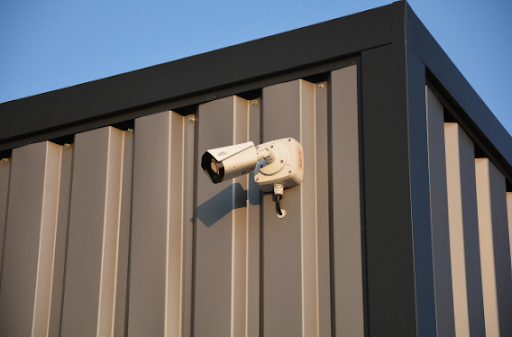
The Role of Security in CRM System Development
With customer relationship management (CRM) systems being integrated deeper within business practices, vulnerabilities continue to grow. User management is essential within a business operations infrastructure, especially in such credo-sensitive areas as customer data and associated customer interactions and transaction histories, all of which is required for ongoing business health and success. Moreover, while businesses/companies are contemplating their CRM needs, they are also wondering how to securely protect this application or operable system from both cyber and physical threats. Security measures are vitally important and a much-needed tool in risk mitigation and business development through CRM system functionality and security.
A robust security solution is not only supposed to prevent serious hacking into a CRM system, but it should also provide operational capacity and securely conduct day-to-day functions. As a result, organizations should confidently develop and maintain relationships with their clients and customers. Especially in establishing a competitive advantage for growing businesses! While the technology is there, it is the confident, optimal consideration, protection, and is provided to [ingest] customer data, whilst complying with regulatory expectations or directives, through improved operational performance to allow further opportunity and growth.

Key Security Technologies Enhancing CRM Systems
1. Biometric Access Control
One of the most effective ways to enhance security while supporting business development is through biometric access control. This security measure uses unique physical characteristics such as fingerprints, facial recognition, or iris scans to authenticate and grant access to sensitive data. By ensuring that only authorized personnel can access the CRM system, businesses reduce the risk of data breaches or unauthorized access to customer information.
Companies like Coram offer biometric access control systems that can assist clients with the integration of such systems into their CRM systems, thereby increasing the efficiency of both security and efficiency in access process. Utilizing biometric identification methods will allow customers to ease access, decrease possible human error, and improve the security of the CRM system.
2. Artificial Intelligence in Surveillance Systems
AI surveillance systems, which employ machine learning algorithms, represent another key component of a solution to secure CRM data. AI surveillance sees everything that happens and can understand what is happening at the same time, and over time. In CRM systems, AI surveillance can recognize how employees and users are accessing customer data and find instances of suspicious access and abnormal behavior, and if it is possible, alert companies to this unusual access of customer data.
Using AI to watch over a CRM system provides companies with the ability to spot a threat before it turns into a significant problem. This move strengthens the overall security framework of a CRM platform and exposes AI to security risks faster than standard surveillance. AI surveillance systems can also be designed to automatically notify security teams in real time to help with possible damage from a potential breach.
3. Internet of Things (IoT) in CRM Security Solutions
The Internet of Things (IoT) can provide an added layer of security to a CRM. IoT devices such as sensors and smart cameras can enhance the CRM system with additional surveillance abilities. For instance, IoT monitoring devices can monitor all physical access points, recognize out-of-the-ordinary activity, and check that only approved personnel are working with the CRM platform.
For example, an IoT-enabled sensor can provide alerts and log information about physical entry that was denied due to non-involvement from a device-level or identified individual. This information would then be sent to the central security system, which can notify others and will have the information to quickly act upon. Scalable IoT security protections would allow businesses of any size to enhance and respond to any unit changes that would change their CRM security model.
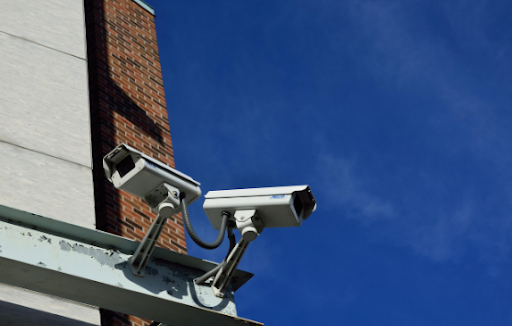
Advantages of Advanced Security Solutions for CRM Systems
1. Mitigating Risks and Enhancing Data Protection
A leading advantage of advanced security solutions within customer relationship management (CRM) systems is that they reduce operational risk. Customer information is held at the centre of CRM platforms; therefore, if customer data is breached, businesses can lose customer trust, incur financial penalties and potentially receive bad press. Advanced security solutions such as biometric access control and artificial intelligence-driven surveillance help reduce the operational risks associated with running a CRM system since they protect customers' personal information 100 percent of the time.
With access to advanced security solutions, businesses are able to mitigate risks with the peace of mind and confidence to market and heighten their market growth, and not constantly needing to consider whether data is vulnerable to breach or risk of theft. As in this case, businesses are able to secure their competitive advantage and lessen interruptions within their business activities.
2. Building Customer Trust
In a world where data is so important, customers are increasingly aware of their data privacy. The integration of advanced security measures into a company’s CRM platforms helps give organizations reassurance to customers that their sensitive information is being processed securely.
Organizations that have, or have put considerable resources in place to ensure effective security systems, are typically viewed in a more dependable and trustworthy light than an organization that is not as interested in having security and privacy programs in place. The value of client relationships and reputation in the market improves generally by the greater peace of mind that better-secured CRM systems deliver.
3. Ensuring Compliance with Data Protection Regulations
As data privacy becomes a growing concern, businesses must maintain compliance around the world with data protection laws and regulations such as HIPAA, GDPR, and CCPA. CRM systems tend to build up a heavy amount of personal data; thus companies will need to consider compliance issues while searching for a CRM system.
Advanced security solutions provide businesses with the tools to achieve compliance. For instance, AI and biometric access controls will help the business track and trace who accessed the data sensitive data and show how access was granted, conforming to the expectations of that industry. The business will incur risk from doing nothing and the risks of compliance violations, which, if identified, carry big penalties. If the business is unconcerned, then they are free to operate without any legal or financial concerns.
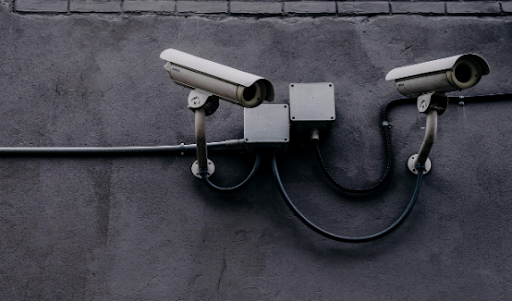
Overcoming the Challenges of Implementing Advanced Security Solutions
1. Initial Investment and Cost
While it's true that a considerable initial investment is involved in implementing higher-dimension security solutions in CRM systems, this can also pose a serious risk for business, especially SMEs; however, the payback for spending on advanced security rarely outweighs the initial costs when you take into consideration the long-term benefits, which includes some security, risk mitigation and customer trust.
Any endeavor undertaken by businesses to be innovative should be treated as long-term investments with substantial payback over time, so it will ultimately lessen the loss from data breaches and prevent company-wide overhead costs.
2. Complexity of Integration
Another consideration in introducing advanced security solutions is the difficulty in integrating new security measures into existing CRM applications. Depending on the CRM being used, a business might encounter technical problems in ensuring that the new security solutions coordinate with the existing system.
To prevent this dilemma, businesses must engage experienced security vendors to assist in the retail security measures and act as integration specialists. This saves time and is done in such a manner by the vendor that interruptions to operations are minimized and integration is as smooth as possible.
3. Ongoing Maintenance and Upgrades
Maintenance of a Steady State. Active monitoring is required by any credible security system to properly administer updates to it when new threats are identified. Organizations will have to accept the fact that they will have to apply such resources to maintaining and servicing their security capabilities (not unlike computer software). This becomes more important for systems, such as AI surveillance systems and IoT devices, that require constant tweaks in order to keep pace with changing security challenges.
FAQs
1. How do advanced security solutions benefit CRM systems?
Advanced security solutions help protect sensitive customer data, reduce operational risks, build customer trust, and ensure compliance with data protection regulations.
2. Is biometric access control an effective method for securing CRM systems?
Yes, biometric access control provides a higher level of security compared to traditional password-based systems, ensuring that only authorized personnel can access sensitive data.
3. How can AI improve the security of CRM systems?
AI enhances CRM security by detecting unusual patterns or behaviors in real-time, helping businesses identify potential threats early and respond effectively.
Conclusion
Implementing advanced security options to a CRM system is vital to maintain customer integrity and trust in the marketplace for businesses to ensure and promote customer data security and to create opportunities for growth in the future. Technological options like biometric access control, AI-enabled surveillance systems, and IoT-based access control, among others, all provide a level of security that ensures customer data can be protected.
Key Takeaways
- Enhanced security solutions are crucial for safeguarding CRM systems, businesses risk growth opportunities.
- Utilizing biometrics-based access, AI-supported surveillance, and IoT secured systems will provide scalable and efficient security for CRM deployments.
- Although companies will have to weigh up the initial outlay and integration complexities, ultimately, they should have good ROI for the added security, compliance, and trust from customers.












